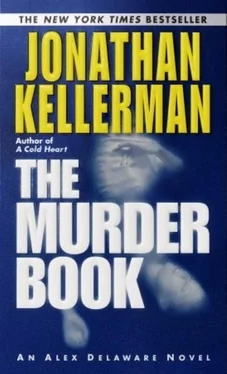"Dressing down," I said. "She sounds depressed."
"Definitely."
"Did she hang around with the other kids?"
"No, she was a loner. Shleppy, withdrawn. I guess today I'd look at her and be thinking schizoid."
"But they saw her as potentially aggressive."
"They did."
"How'd she spend her time?"
"Mostly she sat in her room by herself, dragged herself to meals, returned alone. When I'd pass her in the hall, I'd smile and say hello. But I kept my distance because of the pink tab. A couple of times I think she nodded back, but mostly she shuffled on, keeping her eyes down."
"Was she medicated?"
"I never read her chart. Now that I think about it, it's possible."
"The group leader who tried to draw her out. Do you remember a name?"
"Jody Lavery," she said. "She was a clinical social worker- very nice to me when I had my problem with Larner. Years later I ran into her at a convention, and we ended up becoming friends, did some cross-referring. But forget about talking to her. She died two years ago. And she and I never talked about Caroline. Caroline was more of a nonentity than an entity. If not for the pink tab, I probably wouldn't have paid her any attention, at all. In fact, the only-"
"Sir, madam," said the waiter. Our dishes were set in place, and we cut into our steaks.
"Excellent," I said, after the first bite.
"Glad you like it." She speared a french fry.
"You were about to say something."
"Was I?"
"You were talking about Caroline not being memorable. Then you said 'In fact, the only- ' "
"Hmm- oh yes, I was saying the only person I ever saw her talk to was one of the maintenance men. Willie something… a black guy… Willie Burns. I remember his name because it was the same as Robert Burns and I recall thinking there was nothing Scottish about him."
"He paid special attention to Caroline?"
"I suppose you could say that. Once or twice I came across him and Caroline chatting in the hall, and they moved apart very quickly and Willie resumed working. And one time I did see Willie coming out of Caroline's room, carrying a mop and broom. When he saw me, he said she'd been sick, he was cleaning up. Volunteering an explanation. It was kind of furtive. Whatever the situation, Burns didn't stick around long. One week, he was there, then he was gone and Caroline went back to being alone."
"A week," I said.
"It seemed like a short period."
"Do you remember what month this was?"
"Had to be August. I was only there during August."
Janie Ingalls had been murdered in early June.
"How old was Willy Burns?"
"Not much older than Caroline- maybe twenty, twenty-one. I thought it was nice, someone paying attention to her. Do you know something about him?"
I shook my head. "You didn't read the chart, but did you ever hear why Caroline was sent to Achievement House?"
"I assumed the same reason every other kid was: unable to jump high hurdles. I know that world, Alex. Grew up in Beverly Hills, my dad was an assistant attorney general. I thought I wanted something simple, would never return to California."
"Larry said you went to Penn for grad school."
"Went to Penn and loved it. Then I spent a couple of years at Ann Arbor, came back to Penn and took an assistant professorship. If it had been up to me, I'd have stayed back East. But I married a Wharton guy and he got a fantastic job offer at Union Oil here in L.A. and all of a sudden we were living in a condo on the Wilshire Corridor and I was cramming for the California boards."
"Sounds like things have worked out," I said.
She'd speared steak on her fork and dipped it in bearnaise. The meat remained suspended for a moment, then she placed the fork down on her plate. "Life was rolling along quite nicely, then three summers ago, my father woke up at 4 A.M. with chest pains and my mom called us in a panic. Grant- my husband- and I rushed over and the three of us took Dad to the hospital and while they were working him up, Grant wandered off. I was so caught up supporting Mom and waiting for the verdict on Dad that I didn't pay much attention. Finally, just as they told us Dad was fine- gastric reflux- and we could take him home, Grant showed up and from the look on his face, I knew something was wrong. We didn't talk until after we dropped Mom and Dad off. Then he told me he hadn't been feeling well for a while- bad stomachaches. He'd figured it was job stress, kept thinking the pain would go away, was eating antacids like candy, hadn't wanted to alarm me. But then the pain got unbearable. So while we were at the hospital, he got hold of a doctor he knew- a Penn golfing buddy- and had x rays taken. And they found spots all over. A rare bile-duct tumor that had spread. Five weeks later, I was the mourning widow, living back with Mom and Dad."
"I'm sorry."
She nudged her plate away. "It's rude of me to unload like this." Another tentative smile. "I'll blame it on your being too good a listener."
Without thinking, I reached out and patted her hand. She squeezed my fingers, then spider-walked away, took hold of her wineglass, drank while staring past me.
I took a healthy swallow of beer.
"Want to hear something funny?" she said. "Tonight I'm lecturing about post-traumatic stress. Listen, Alex, it's been nice meeting you, and good luck with whatever you're trying to do, but I've really got to run."
She summoned the waiter, and, over her objections, I paid the check. She removed a gold compact and lipstick from her bag, freshened her mouth, touched a long, black eyelash, checked her face in the mirror. We got up from the table. I'd figured her for tall, but in three-inch heels she wasn't more than five-five. Another little looker. Just like Robin.
We left the restaurant together. Her car was a ten-year-old black Jaguar XJS convertible that she stepped into with agility and revved hard. I watched her drive away. Her eyes stayed fixed on the road.
Two new names:
Michael Larner.
Willie Burns.
Perhaps both were irrelevant, but I drove south into Cheviot Hills, located Achievement House on a cul-de-sac just east of Motor and south of Palms, idled the Seville across the street.
The building was an undistinguished two-story box next to an open parking lot, pale blue in the moonlight, surrounded by white iron fencing. The front façade was windowless. Glass doors blocked entry to what was probably an interior courtyard. Half a dozen cars sat in the lot under high-voltage lighting, but the building was dark and there was no signage I could see from this distance. Wondering if I had the right location, I got out and crossed the street and peered through the fence slats.
Tiny white numbers verified the address. Tiny white letters, nearly invisible in the darkness spelled out:
Achievement House. Private Property.
I squinted to get a look at what was behind the glass doors, but the courtyard- if that's what it was- was unlit, and all I made out was reflection. The street was far from quiet; traffic from Motor intruded in bursts, and the more distant rumble of the freeway thrummed nonstop. I got back in the car, drove to the U., returned to the Research Library, got my itchy hands on that old friend, the periodicals index.
Nothing on Willie Burns, which was no surprise. How many janitors made the news? But Michael Larner's name popped up twelve times during the past two decades.
Two citations were dated from Larner's tenure as director of Achievement House: coverage of fund-raising events, no photos, no quotes. Then nothing for the next three years, until Larner popped up as official spokesman for Maxwell Films, demeaning the character of an actress sued by the film company for breach of contract. No follow-up on how that case resolved and a year later, Larner had made another occupational change: an "independent producer" inking a deal with the very same actress for a sci-fi epic- a movie I'd never heard of.
Читать дальше












